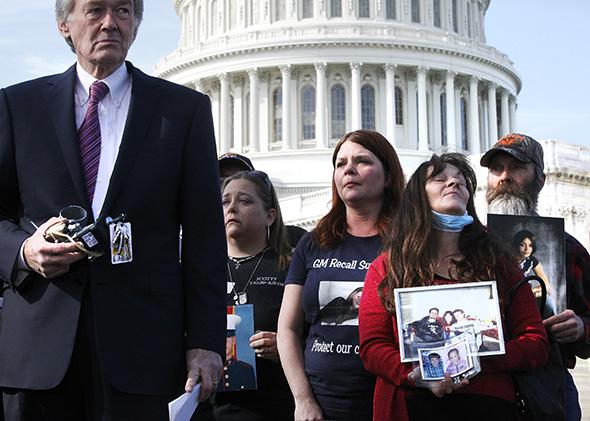A design problem in a General Motors car contributes to dozens of automobile crashes and numerous deaths. Charging that the company failed to correct a known defect, lawyers file more than 100 lawsuits against the company. GM responds by hiring investigators to question the motives of its critics. Eventually, as congressional and media scrutiny increase, the head of GM apologizes for the company’s behavior. Sound familiar? You may have been reading about such a case over the past month. But actually, this story is from 1965 when Ralph Nader published Unsafe at Any Speed, a book that charged General Motors with knowingly selling unsafe Corvairs and the auto industry as a whole with putting profit above safety.
Now almost 50 years later, why is the United States still struggling to ensure that cars companies make safe cars? And why must we still question whether regulatory agencies take their mandate to protect public health seriously? In 1966, the emerging consumer movement persuaded Congress to pass the National Highway Safety and Transportation Act to correct some of the abuses Nader had documented. In the decades since, car safety has improved, with United States motor vehicle death rates falling from 25.9 per 100,000 people in 1966 to 10.8 per 100,000 in 2012. This is a clear indication that regulations save lives. But other nations have done much better. According to the latest report from the International Transport Forum, a body that monitors global road safety, the auto death rate in the United States is more than three times higher than the rate in Sweden, a country that has made auto safety a priority. If the United States had achieved Sweden’s rate, in 2011 more than 20,000 U.S. automobile deaths would have been averted.
Since its inception, however, the auto industry has resisted regulation, failed to disclose problems, and refused to correct problems when they were detected. In the past few weeks, General Motors has recalled 1.6 million Cobalts and other small cars to repair defective ignition switches that have been associated with at least 12 deaths. The company had first learned of this and other defects a decade ago—in 2004, before the first Cobalt was released. On March 17th, Mary Barra, the chief executive of GM, observed, “Something went very wrong in our processes in this instance, and terrible things happened.”
In a separate action, General Motors has recalled 1.33 million sports utility vehicles because air bags failed to deploy after crashes. Another review of GM air bag failures from 2003 to 2012 found that they may have contributed to more than 300 deaths. GM is not alone in its safety problems. Toyota recently agreed to pay $1.2 billion to settle federal criminal charges related to sudden acceleration of its vehicles.
For the past 50 years, too many corporate leaders in the auto industry as well as in the food, pharmaceutical, firearms, and other industries have chosen to follow the playbook written by the tobacco industry. They have challenged the evidence justifying regulation, exaggerated the economic costs of safer products, and used their political and financial clout to defeat public health policies and underfund the agencies charged with enforcement. These behaviors have become so normalized they seem inevitable rather than immoral or criminal.
In the case of the auto industry, resistance to regulation has caused preventable deaths, illnesses, and injuries. From the 1960s through the 1980s, the automobile industry initially opposed standard seatbelts, airbags, better brakes, and better emission standards. For more than 15 years, the U.S. auto industry successfully opposed regulations to require either airbags or automatically closing seat belts in automobiles. Finally, in 1986, the Supreme Court ordered the National Highway Transportation Safety Administration to implement the rules. A 1988 study estimated this delay contributed to at least 40,000 deaths and 1 million injuries at a cost to society of more than $17 billion. The auto industry’s resistance to regulation kills people indirectly as well. Earlier this week, the World Health Organization released a report showing that global deaths from air pollution were twice as high as previously thought, largely through air pollution’s role in in cardiovascular deaths. In the United States, automobiles are a primary source of air pollution, and the auto industry has long opposed or delayed stricter emission standards.
No corporate executives will say publicly that they prefer profits to preventing deaths, even though their actions prove otherwise. The damage control advice of the day seems to be to encourage CEOs to make rapid and profuse apologies for corporate cover-ups after they are disclosed. But as long as the public tolerates allowing corporations and their allies to have veto power over public health policy, our nation will continue to experience preventable deaths and avoidable illness and injuries. In the hearings into GM this week, Congress is correct to pursue who in GM and the NHTSA knew what when. But the deeper task should be to strengthen the visible hand of government in protecting public health so we aren’t still facing this issue 50 years from now. As a first step, Congress should provide the highway safety agency with the resources needed to meet its mandates fully; in 2014, the agency received 10 percent less than it requested. Congress should also monitor agency enforcement of safety standards regularly, not just when defects are publicly disclosed. In addition, the safety agency should hold auto executives who fail to disclose defects criminally as well as civilly liable for the resulting deaths and injuries.
